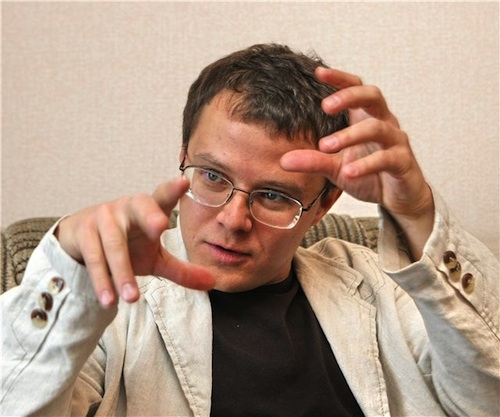Gleb Shulpyakov's A Fireproof Box
The Rumpus's David Peak reviews a title for us Russian poetry fans, the "porous work" that is A Fireproof Box, by Gleb Shulpyakov (Canarium 2011); and translated by Christopher Mattison, who has been behind such great ventures as Zoland Poetry, Adventures in Poetry and Zephyr Press. Mattison has done a fine job with Shulpyakov's work, as Peak notes:
So how do I approach the task of reviewing a book of poems written in Russian? The answer is that I can’t—not really. Critically, I’m out of my depth no matter how much research I do, how much Russian literature and poetry I study. And after reading A Fire-Proof Box, a collection of poems by Novaya Yunost’s poetry editor, Gleb Shulpyakov, the best I can do is say that the translation, performed by Christopher Mattison, feels very much alive in its flexing of language, neither shoehorned nor graceless. A Fire-Proof Box is a porous work, languages overlapped, breathing, an English translation that manages to capture the icy weight of classically “Russian” sensibilities.
Take, for example, this excerpt from the book’s first section, “Flick:”
A quiet little village with a mournful puddle
in its square, where the tyrant’s monument
stretches his arms towards a better world
though this better world is no longer affordable,in an ancient little town, with the tolling of cans
and plaster rustling in the wind—
“What are you, prima?”—“No, Doña Ana,
widowed on the stage.”The deceased, fitted in boots, carried
down the street with feet pointing to paradise:
“Listen, do you believe in omens?”
“I believe, but don’t really understand them…”
Peak goes on to excerpt more of Shulpyakov's "shimmering imagery and textural descriptors," and notes the allusions to great artists: "There are writers, painters, composers. Pushkin, Blok, Kafka, Cezanne, Vermeer, Shostakovich." Peak also takes a look at the book's centerpiece, Shulpyakov's "Cherries," which acts as a "narrative stand-in [that] details a summer spent in a dacha outside of Moscow, the pained consciousness of working on a play beneath the ever-present shadow of Chekov."
Read the full review here. Oh, and very cool: Shulpyakov was also in the roster of the much-missed The Poker (no. 3).



